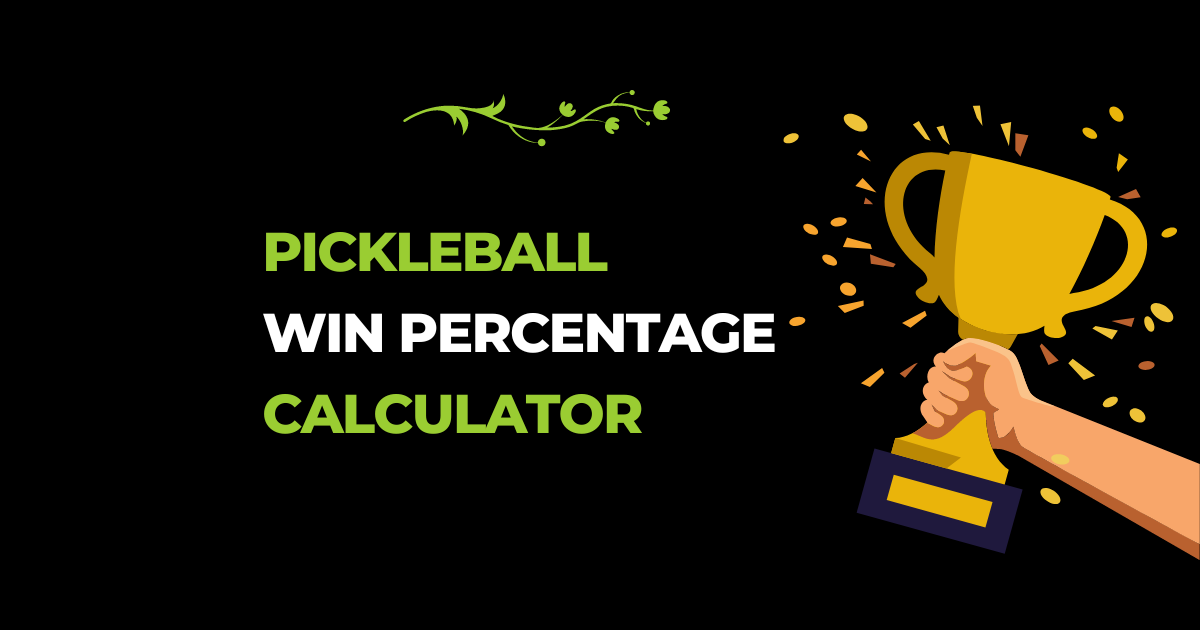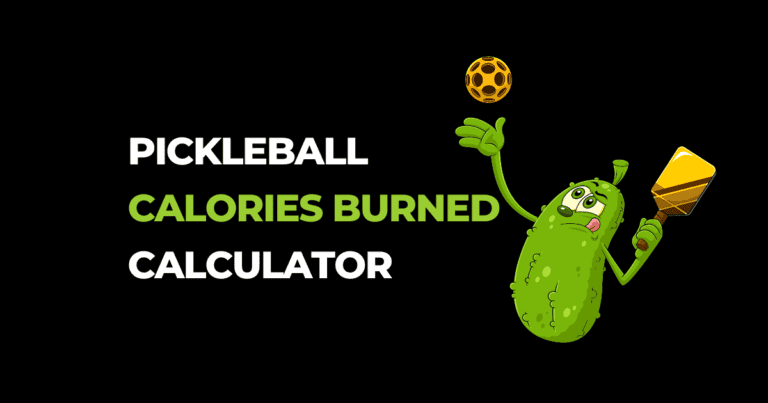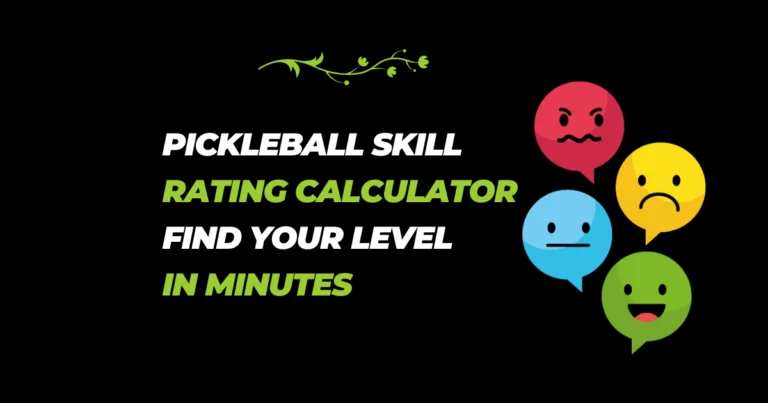Last updated on: July 12, 2024
The Pickleball Win Percentage Calculator is a tool made to help you figure out your chances of winning a pickleball match. Just put in your skill level, your opponent’s skill level, the type of court, the match type, and fatigue level. The calculator will then give you a percentage on your chance of winning, plus tips that fit your situation.
Use our calculator to find out your chances of winning your next pickleball match.
Pickleball Win Percentage Calculator
Step-by-Step Guide to Using the Calculator
Using the Pickleball Win Percentage Calculator is straightforward. Here’s a step-by-step guide to help you get started:
- Access the Calculator: Open the calculator on your device.
- Enter Your Skill Level: Select your skill level from the dropdown menu.
- Enter Your Opponent’s Skill Level: Select your opponent’s skill level from the dropdown menu.
- Select the Court Surface: Choose whether you’re playing on an indoor or outdoor court.
- Select the Match Type: Choose between singles or doubles.
- Enter Your Fatigue Level: Use the slider or input box to enter your fatigue level on a scale of 1 to 10.
- Submit the Form: Click the “Predict Match Outcome” button.
- View the Results: The calculator will display your win probability and a motivational message.
Understanding the Inputs
Skill Levels
Skill levels in pickleball range from 1.0 – 2.0 (Beginner) to 5.0 (Open). Here’s a breakdown:
- 1.0 – 2.0 – Beginner: New to the game, learning basic rules and techniques.
- 2.5 – Advanced Beginner: Familiar with the game, starting to develop a consistent rally.
- 3.0 – Lower Intermediate: More consistent with serves and returns, starting to understand strategy.
- 3.5 – Intermediate: Good understanding of game strategy, more consistent strokes, and better control.
- 4.0 – Advanced Intermediate: High level of consistency, good control, and strategic understanding.
- 4.5 – Advanced: Very high level of play, excellent control and strategic thinking.
- 5.0+ – Open: Top-level players, professional or near-professional skill set.
Skill Level Mismatches
When there’s a significant skill level mismatch between players, the probability of the higher-rated player winning increases dramatically. Here’s a rough guide to win probabilities based on skill level differences:
- 0.5 level difference: 60-70% win probability for the higher-rated player
- 1.0 level difference: 75-85% win probability for the higher-rated player
- 1.5+ level difference: 90%+ win probability for the higher-rated player
However, it’s important to remember that upsets can and do happen. The beauty of pickleball lies in its unpredictability, where factors beyond skill level can influence the outcome.
The Impact of Court Surfaces
The surface you play on can significantly affect your game and, consequently, match predictions. Pickleball is played on various surfaces, each with its unique characteristics. Let’s discus the main types:
Types of Pickleball Court Surfaces
- Indoor Courts
- Usually made of wood or synthetic materials
- Consistent bounce and playing conditions
- Faster gameplay due to lack of wind and weather factors
- Outdoor Hard Courts
- Typically asphalt or concrete with an acrylic coating
- More affected by weather conditions
- Slightly slower gameplay compared to indoor courts
How Court Surfaces Affect Play
Different surfaces can impact various aspects of the game:
- Ball Speed: Indoor courts generally produce faster gameplay..
- Ball Bounce: The height and consistency of the ball bounce vary across surfaces, affecting shot selection and timing.
- Player Movement:Surfaces can vary; indoor courts generally offer better traction.
- Fatigue: Harder surfaces can be more taxing on players’ joints, potentially increasing fatigue over long matches.
When making predictions, consider how well a player’s style matches the court surface. For example:
- Aggressive players might have an advantage on faster surfaces like indoor courts.
- Defensive players could perform better on slower surfaces like clay.
- All-around players might adapt more easily to different surfaces.
In our prediction model, we count court surfaces by applying a small adjustment factor. For example, if a player typically performs better outdoors, their win probability might be increased slightly for outdoor matches.
Singles vs. Doubles: How Match Type Affects Predictions
Pickleball is unique in that it’s widely played in both singles and doubles formats. The dynamics of these two game types are significantly different, which has a significant impact on match predictions.
Singles Pickleball
In singles pickleball:
- Players cover the entire court themselves
- Physical stamina and court coverage are important
- Powerful serves and groundstrokes are more effective
- Quick reflexes and agility are highly valuable
When predicting singles matches, consider:
- The player’s overall fitness level
- Their ability to generate power in shots
- Speed and agility for court coverage
- Mental toughness to handle the pressure of solo play
Doubles Pickleball
Doubles pickleball introduces new elements:
- Teamwork and communication are important
- Soft game and dinking skills become more important
- Positioning and strategy play a larger role
- The serve is slightly less dominant due to the two-bounce rule
For doubles predictions, factor in:
- How well the partners complement each other’s playing styles
- Their experience playing together as a team
- Each player’s ability in the soft game, especially at the net
- Their strategic understanding of doubles positioning and tactics
Adjusting Predictions for Match Type
When using our prediction model, we apply a modifier for match type. Here’s how it works:
- For singles matches, the model relies more heavily on individual skill ratings and physical factors.
- For doubles matches, the model adjusts the win probability towards 50%, reflecting the increased variability introduced by having four players on the court.
In doubles, a strong partner can sometimes compensate for a weaker player, which can make outcomes less predictable based solely on individual skill levels.
The Fatigue Factor: Why Stamina Matters
Fatigue is often an overlooked aspect of pickleball match prediction, but it can be a game-changer, especially in longer matches or tournaments. Understanding fatigue can significantly improve the accuracy of your predictions.
How Fatigue Affects Performance
Fatigue can impact a player’s performance in several ways:
- Reduced Power: Tired muscles can’t generate as much force, leading to weaker shots.
- Decreased Accuracy: Fatigue affects hand-eye coordination and timing.
- Slower Reaction Times: Tired players may struggle to react quickly to fast-paced exchanges.
- Poor Decision Making: Mental fatigue can lead to tactical errors and poor shot selection.
- Limited Court Coverage: Exhausted players may struggle to reach difficult shots.
Factors Influencing Fatigue
Several factors contribute to a player’s fatigue level:
- Match Duration: Longer matches naturally lead to increased fatigue.
- Playing Style: Aggressive players who rely on power may tire more quickly.
- Age and Fitness Level: Older or less fit players may experience fatigue sooner.
- Tournament Schedule: Multiple matches in a day can accumulate fatigue.
- Weather Conditions: Hot or humid conditions can accelerate fatigue.
Incorporating Fatigue into Predictions
Our prediction model includes a fatigue factor, which you can input on a scale of 1-10. Here’s a general guide:
| Fatigue Level | Description |
| 1-3 | Fresh, well-rested |
| 4-6 | Moderate fatigue, typical for regular play |
| 7-8 | Significant fatigue, e.g., after several matches |
| 9-10 | Extreme fatigue, risk of diminished performance |
The model adjusts win probabilities based on this fatigue factor. For example, a highly skilled player with extreme fatigue might see their win probability decrease significantly against a fresher opponent.
Strategies for Managing Fatigue
To improve your predictive edge and on-court performance, consider these fatigue management strategies:
- Proper hydration and nutrition before and during play
- Efficient movement and energy conservation during matches
- Strategic use of timeouts and between-point rests
- Regular conditioning to improve overall stamina
- Adequate sleep and recovery between playing sessions
By understanding fatigue management strategies you can make more accurate predictions and potentially gain an advantage in your own matches.
How the Win Probability is Calculated
The calculator uses a combination of factors to determine your win probability. Here’s a breakdown of the process:
- Skill Level Comparison: The difference between your skill level and your opponent’s skill level is the primary factor. A larger difference means a higher win probability for the higher-skilled player.
- Court Surface Adjustment: If playing outdoors, a slight increase in win probability is applied due to additional variables.
- Match Type Adjustment: Doubles matches tend to even out skill differences slightly, so the win probability is adjusted accordingly.
- Fatigue Adjustment: Higher fatigue levels decrease the win probability, as fatigue can impair performance.
Calculation Formula
The formula used to calculate the base win probability is:
Base Probability=1/1+-e(Opponent’s Skill Level−Your Skill Level)/0.4
Adjustments are then applied based on court surface, match type, and fatigue level.
Interpreting the Results
Once you submit the form, the calculator provides a win probability percentage and a motivational message. Here’s how to interpret the results:
- 80-99%: You’re strongly favored to win. Stay focused and confident.
- 60-79%: You have a good chance of winning. Keep up the pressure.
- 40-59%: It’s going to be a close match. Every point counts.
- 20-39%: You’re the underdog, but upsets happen. Play your best game.
- 1-19%: It’s going to be a tough match, but give it your all and look for opportunities.
Example Calculations
Let’s look at a few examples to better understand how the calculator works.
Example 1: Beginner vs. Advanced Beginner
- Your Skill Level: 2.0
- Opponent’s Skill Level: 2.5
- Court Surface: Indoor
- Match Type: Singles
- Your Fatigue Level: 5
Win Probability: 35% Message: “You’re the underdog, but upsets happen! Play your best game.”
Example 2: Intermediate vs. Advanced
- Your Skill Level: 3.5
- Opponent’s Skill Level: 4.5
- Court Surface: Outdoor
- Match Type: Doubles
- Your Fatigue Level: 6
Win Probability: 25% Message: “It’s going to be a tough match, but give it your all and look for opportunities!”
Tips for Improving Your Win Probability
Improving your win probability involves enhancing your skills and preparing effectively for matches. Here are some tips:
Improve Your Skills
- Practice Regularly: Consistent practice helps you develop muscle memory and improve your techniques.
- Focus on Weak Areas: Identify and work on your weaknesses to become a more well-rounded player.
- Take Lessons: Professional coaching can provide personalized guidance and advanced techniques.
Prepare for Matches
- Warm Up Properly: Make sure you’re physically prepared for the match with a good warm-up routine.
- Stay Hydrated: Proper hydration can prevent fatigue and improve performance.
- Get Enough Rest: Make sure you’re well-rested before matches to avoid high fatigue levels.
Strategic Play
- Study Your Opponent: Understanding your opponent’s strengths and weaknesses can help you develop a game plan.
- Play Smart: Use strategies like targeting your opponent’s weaker side or mixing up your shots to keep them off balance.
Mental Preparation
- Stay Positive: Maintain a positive attitude and confidence in your abilities.
- Focus on Each Point: Concentrate on one point at a time rather than the overall score.
- Manage Stress: Use relaxation techniques to stay calm and focused during matches.
FAQs about the Pickleball Win Percentage Calculator
Q1: How accurate is the Pickleball Win Percentage Calculator?
The calculator provides a reasonably accurate estimation based on statistical models of skill level differentials and other factors. However, it’s important to remember that no calculator can predict outcomes with absolute certainty, as individual performance can vary.
Q2: Can I use the calculator for tournament matches?
Yes, you can use the calculator for both casual and tournament matches to estimate your win probability. Make sure you input accurate skill levels and other details for the best results.
Q3: How often should I reassess my skill level?
It’s a good idea to reassess your skill level every 3-6 months, or after significant periods of practice or competition. Your local pickleball club or a certified instructor can help you determine your current skill level accurately.
Q4: What should I do if my opponent’s skill level is between two options?
If your opponent’s skill level falls between two options (e.g., between 3.0 and 3.5), choose the option that best represents their overall skill level based on your assessment.
Q5: How does fatigue affect win probability?
Fatigue can reduce your reaction time and overall performance. Higher fatigue levels typically decrease your win probability.
Q6: Can I improve my win probability through training?
Yes, improving your skill level through training and practice can increase your win probability over time. Focus on enhancing your technique, strategy, and physical conditioning.
Q7: What should I do if my calculated win probability is very low against a specific opponent?
A low win probability doesn’t mean you can’t win. Use it as motivation to:
- Focus on learning and improvement rather than just the outcome
- Analyze your opponent’s strengths and weaknesses
- Try different strategies that might disrupt their game
- Set small, achievable goals within the match
- Use the opportunity to play without pressure and potentially surprise your opponent
Remember, every match is an opportunity to learn and improve, regardless of the predicted outcome.
Conclusion
The Pickleball Win Percentage Calculator helps you understand your chances of winning based on your skills, court type, and how tired you are. It’s great for planning your games and setting goals. But remember, while it gives you an idea, practicing, staying fit, and being mentally ready are still very important for doing well in pickleball. Use the calculator to improve your game and enjoy playing pickleball even more!
Share any helpful tips you have in the comments!
Learn: Are Hoka Shoes Good For Pickleball?, Lucy Kovalova, Top Richest Pickleball Players, Top Female Pickleball Players , Top Men’s Pickleball Players
Equipment: Best pickleball paddles under $100, Where to Rent Pickleball




19 Comments